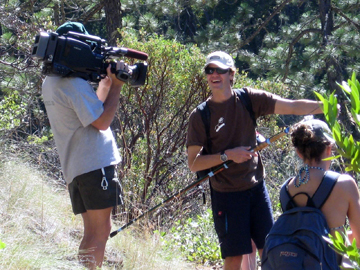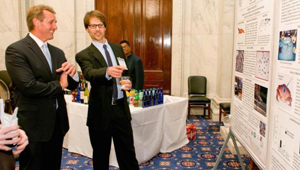For decades, members of the U.S. Congress have found creative ways of blasting federal spending they deem wasteful. Between 1975 and 1988, Sen. William Proxmire (D-Wisc.) roasted government spending with his monthly Golden Fleece Awards. In recent years, lawmakers have compiled “wastebooks”— humorous annual exposes of supposedly “frivolous” government projects. The 2017 congressional wastebook, titled “PORKémon Go,” features author Sen. Jeff Flake (R-Ariz.) as the character Ash Ketchum. The report rails against a list of “wasteful” projects, given catchy titles like “High-Speed Train Going Nowhere Fast,” “Could Dinosaurs Sing?,” and “How To Be More Popular Online.”
In 2011, David Scholnick, a marine biologist at Pacific University in Forest Grove, Oregon, became the target of such scrutiny. To study how bacterial infections affect the energy levels of shrimp, he cobbled together a “treadmill” made of skateboard bearings, a used truck inner tube and Plexiglas. Hoping to garner interest in his lab’s research, he took a video of a shrimp on this treadmill. Within days, it had millions of views on YouTube and multiple spinoffs with different soundtracks. Scholnick was invited to bring the shrimp to talk shows, and his shrimp on a treadmill became a media sensation.
But then, Sen. Tom Coburn (R-Okla.), who at the time produced the annual wastebook, learned of Scholnick’s shrimp. It was highlighted in Coburn’s 2011 wastebook—which claimed the government had granted Scholnick $3 million to put shrimp on treadmills. Numerous media outlets called Scholnick to ask if he thought it was fair for taxpayers to pay for the treadmill.
Now, Scholnick and other scientists are speaking out to defend their work. He has written several articles detailing how his shrimp treadmill became a “political plaything.” Scholnick and other scientists talked about the value of “silly-sounding science” at the February 2017 meeting of the American Association for the Advancement of Science in Boston. He sat down with SciCom’s Ula Chrobak to talk shrimp, politics and science that may sound silly, but isn’t.
Why did you start studying sick shrimp?
I’m a physiologist who studies animal function in invertebrates. At some point I started finding all kinds of diseases in the animals and I realized it was impacting all of my data.
In the marine [environment] there’s lot of bacteria and viruses in the water—millions per tablespoon. We’re finding lots of bacteria in the shrimps’ blood, which is unusual for an animal. They have really robust immune systems.
These are wild-caught animals that look healthy and otherwise seem fine. We don’t know how long they’ve been sick and don’t know what it’s doing to them. It’s unclear why their immune systems aren’t attacking these bacteria. When I looked into what was going on, no one really knew. It changed my whole career.
How did the treadmill come about?
In nature, shrimp are running around all the time. They’re swimming long distances at night, they’re constantly feeding and getting away from predators, so just by studying them sitting in a lab you don’t get the full picture.
I thought it would be good to study them when they’re active. Is it causing their immune system to react with these bacteria? Are they able to do the same things as animals that don’t have the bacteria? Can they respire at low oxygen? Are they building up lactic acid? All the same questions you would ask a human.
So that’s how shrimp on a treadmill happened.
Why did it blow up into a media sensation?
I made a little video of the shrimp running on a treadmill, and I put in on my faculty page to get students in my lab. Then someone lifted it and put it up on YouTube without me knowing it and it got really popular. Then my phone started ringing like crazy because it was really popular and it looked like really fun, silly science. I was giving interviews trying to explain the science, and people wanted to know about what the shrimp’s name was, and that kind of thing.
When did people start to scrutinize your work?
All of sudden, overnight, it was went from answering YouTube questions to a congressional report attacking the National Science Foundation calling this the number one wasteful study. Then, Fox News started calling and it was just nonstop.
I’m not an emotional person, but I hung up on one [phone call]. [The reporter] just kept saying, "Do you think it’s right that taxpayers are paying a million dollars for you to run shrimp on treadmills?" And I’m like, "No, that would make no sense." And he’s like, "So you can’t defend your own work?" And it just went on and on in this circle.
It wasn’t like there was a million-dollar or three-million-dollar grant to study shrimp on treadmills. Lots of small grants had been involved to study disease in shrimp and other animals. So the wastebook just tied all those grants together and said this scientist is wasting $3 million running shrimp on treadmills.
They come in with a bias. They don’t want both sides of the story.
Did you get any support when your work was getting attacked?
My university thought it was funny. They just put links to all the articles that came out against what I was doing. And NSF said, "We support our scientists and the peer review process," and that’s all they said.
It wasn’t just me, it was a variety of scientists from multiple disciplines. NSF never said, "Look, this work is important for this reason." NSF never had a rebuttal. It was a huge mistake not to recognize how vulnerable scientists can be, and how serious this could become.
I think now they do. They do a much better job, and I think universities are prepared.
What do you hope to get from sharing your story?
It would be nice if people were a little more prepared. I wasn’t really prepared. I made a lot of mistakes and didn’t get much, if any, support. I think it’s important that universities get involved, that the American Association for the Advancement of Science gets involved, and that societies for the different disciplines are involved as well.
"I think scientists are becoming aware it’s time to have a political awakening."
What mistakes did you make in how you responded to the shrimp incident?
I didn’t respond. I just wanted to go back to my lab, do my research and ignore it, because I didn’t think anyone would take it seriously. I didn’t really think about what the repercussions would be at all.
What is the significance of your research?
It has impacts on the direction of what’s happening in oceans overall. We’re able to show a lot of this research is tied to recent climate change issues. When I bring the shrimp to the lab and raise the temperature just a little bit, that’s when the bacteria really become opportunistic.
You’ve mentioned shrimp are part of a multi-billion-dollar shellfish industry. Are fishermen worried about sick shrimp, too?
When I started my position, there was a lot of tension between the fishermen and the biologists. The fishermen always think that this study will result in more regulation, which will mean lower financial gain.
And now they’re bringing animals to me, like, “These animals are sick, we can’t take them to market, what is going on?" They’re really curious: "Why am I not catching shrimp any more, or when I do, they look awful and their gills are black and by the time we pull them up out of the net they’re dead?"
They want to know, and that’s pretty telling. I think they’re deeply concerned that their livelihood is going to go away.
If a lot of this silly-sounding research is important, how do you communicate that to the public?
I’ve tried to use humor. I found being argumentative or defensive didn’t go over well at all. The first time I contacted Tom Coburn’s office, they said, “Obviously if you’re protesting so much, you must be guilty." So I just decided that maybe I could gain a little more traction if I could add some humor to it and try to make [their accusations] sound as frivolous as it seemed to me.
Given the current administration, this seems like it might be an especially difficult time for scientists with silly-sounding studies. Do you have any advice for scientists on how to weather this administration?
I think we all need to be a little bit better about being publicly aware and going out there and being advocates for science—what we do, and the importance of it—in a variety of ways. This administration might swing completely in a direction away from data, and that is not OK for anyone. We should take the enthusiasm we have for doing science and all the energy for data and analysis, and be creative about ways to make sure that situation isn’t going to happen.
I think scientists are becoming aware it’s time to have a political awakening. If we don’t, these decisions won’t be fact-based.
____________________
© 2017 Ula Chrobak. Ula’s non-frivolous stories reside at www.ulachrobak.com.


